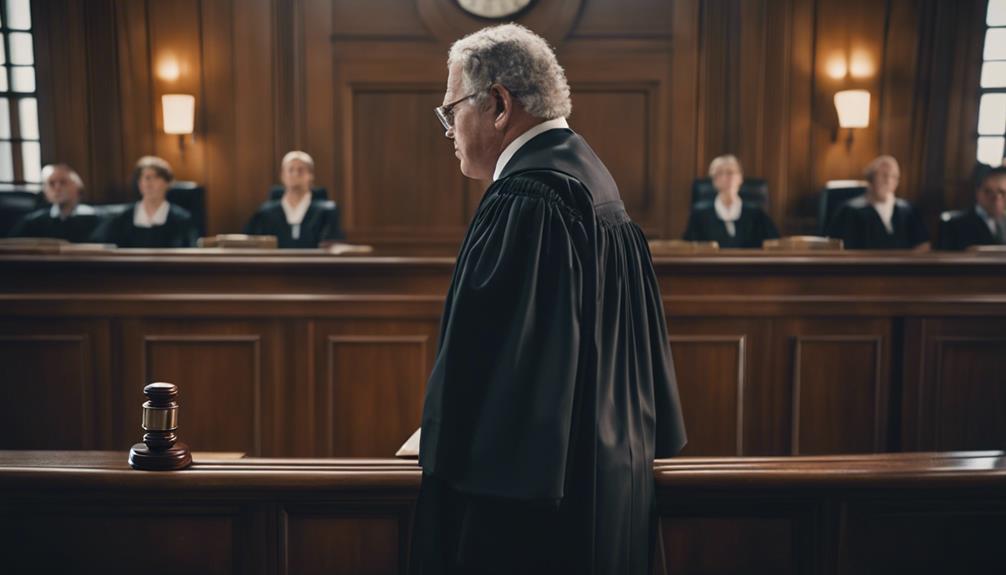Adjudication withheld is a legal concept where a court decides not to formally convict someone, offering a way to avoid a guilty judgment and potential conviction. It's common in legal proceedings and background checks, impacting one's record. The process often involves probation or special conditions, and its presence on record can affect job opportunities and legal matters like firearm possession. Understanding its implications, especially for first-time offenders, with legal guidance is vital. Failing to comply with probation can have serious consequences. Make informed decisions regarding this term's impact on your future opportunities. More insights await regarding this legal nuance.
Key Takeaways
- Adjudication Withheld is a legal decision in Florida to not formally convict an individual.
- It allows for avoiding a criminal conviction by fulfilling probation or special conditions.
- Qualification is mainly for first-time offenders with minimal criminal history.
- The decision remains on record indefinitely, affecting future opportunities and legal proceedings.
- Violating probation terms can lead to severe penalties and impact one's rights and opportunities.
Definition of Adjudication Withheld
Adjudication withheld is a legal term in Florida that refers to the court's decision not to formally convict an individual of a criminal offense. When adjudication is withheld, it means that the court has chosen to withhold a formal judgment of guilt. This status allows individuals to avoid a conviction for certain offenses, offering a valuable alternative to a guilty verdict.
Even though adjudication is withheld, it's essential to understand that this doesn't mean the individual is completely free of consequences. The fact that adjudication was withheld will still appear on the individual's record, indicating that they were involved in a criminal matter. This status can have implications in various aspects of life, including future legal proceedings and background checks.
Understanding the implications of withheld adjudication is important, especially for individuals with prior convictions or those facing potential felony charges.
Process of Withholding Adjudication

Understanding how the process of withholding adjudication works in Florida can provide insight into the legal mechanisms involved in sentencing without a formal conviction. When an individual enters a plea or undergoes a trial, the judge may decide to withhold adjudication, allowing them to avoid a criminal conviction on their record. Instead, they're placed on probation or given special conditions to fulfill. Successful completion of probation typically results in the case being closed without a formal conviction, offering a chance to move forward without the burden of a criminal record.
However, it's important to adhere to the probation terms diligently, as any violation could lead to severe consequences, including losing the benefit of having adjudication withheld. Therefore, individuals must approach the process seriously, understanding that compliance is essential to maintain the favorable outcome of avoiding a formal conviction in the state of Florida.
Criteria for Qualifying for Adjudication Withheld
Moving from the process of withholding adjudication in Florida, the eligibility requirements for qualifying for adjudication withheld primarily focus on the individual's criminal background and the discretion of the court and prosecutor. To qualify for adjudication withheld, individuals are typically first-time offenders. However, exceptions may exist for those with minimal criminal history.
It's important to note that certain felony types may not be eligible for adjudication withheld due to the severity of the offense. The decision to grant adjudication withheld rests on the discretion of the court and prosecutor, who consider various factors before making a determination.
Seeking legal counsel can provide valuable guidance on whether an individual meets the eligibility criteria for adjudication withheld. Understanding these qualifying criteria is necessary to navigate the legal process effectively and make informed decisions regarding one's case.
Duration of Adjudication Withheld on Record

The presence of adjudication withheld on an individual's criminal record has lasting implications. Adjudication withheld remains on the record indefinitely, impacting various aspects of the individual's life.
Here are some key points to keep in mind regarding the duration of adjudication withheld on record:
- Employers and background check agencies can access information on adjudication withheld, potentially affecting job opportunities and career advancement.
- Withheld adjudication may have consequences on future legal proceedings and sentencing, leading to increased scrutiny or harsher penalties.
- The record of adjudication withheld can influence certain rights and privileges, such as the ability to possess firearms or participate in certain government programs.
Understanding the implications of adjudication withheld and seeking legal guidance are essential for individuals dealing with the complexities of having such a mark on their criminal record. Being aware of how long this information remains on record is important for making informed decisions about one's future.
Implications of Adjudication Withheld
What're the practical consequences of having adjudication withheld on a criminal record? Adjudication withheld means that a formal conviction isn't entered for a charge. While this may seem like a favorable outcome, there are still significant implications to take into account.
Individuals with adjudication withheld may face probation and court-imposed conditions that must be followed. It's important to adhere to these requirements, as violating probation can result in more severe penalties than the initial charge.
Moreover, even with adjudication withheld, this information remains on the individual's criminal record unless sealed. This can impact future opportunities such as employment, housing, or educational pursuits.
It's crucial to understand that while adjudication withheld may offer some reprieve from immediate court consequences, it doesn't erase the incident entirely. Hence, it's advisable to comply with all court conditions and seek legal guidance on how to potentially seal your criminal record in the future to mitigate any long-term repercussions.
Frequently Asked Questions
Does Adjudication Withheld Mean a Conviction in Florida?
No, adjudication withheld in Florida doesn't equate to a conviction. It means no formal conviction is entered, and probation is ordered without a guilty verdict. This status allows individuals to avoid the negative consequences of a criminal conviction.
With adjudication withheld, the person isn't technically convicted of the offense.
Can I Own a Gun With Adjudication Withheld in Florida?
Yes, individuals can own a gun with adjudication withheld in Florida, subject to specific circumstances and regulations. Adjudication withheld doesn't automatically prohibit gun ownership. Certain conditions and limitations may apply.
Understanding both state and federal gun laws is important for those in this situation. Consulting with a legal expert can provide necessary clarity on the rights and responsibilities associated with owning a gun with adjudication withheld in Florida.
What Is the Difference Between Adjudication and Conviction?
When examining the difference between adjudication and conviction, it's important to understand that adjudication involves resolving legal matters, while a conviction specifically denotes guilt. Adjudication may lead to different outcomes like acquittal or dismissal, whereas a conviction results in a formal finding of guilt.
Adjudication can encompass decisions beyond guilt, such as sentencing, while a conviction solely focuses on guilt. Adjudication withheld signifies no formal conviction, indicating a case resolution without a guilty verdict.
Does Adjudicate Mean Guilty?
Adjudication doesn't mean guilty. It's a legal term showing the court didn't formally convict someone.
Withholding adjudication allows for probation without a standard conviction. This isn't the same as being found guilty.
It's an important distinction in the legal system.
Conclusion
To sum up, adjudication withheld is a legal term used when a court decides not to enter a formal judgment, potentially avoiding a conviction on someone's record.
Remember, 'a stitch in time saves nine,' so understanding the implications of adjudication withheld can help navigate the legal system effectively. It’s essential to be aware of how adjudication withheld may impact future legal matters, as it can sometimes be perceived differently in various scenarios, such as employment or housing applications. Similarly, when analyzing concepts like “the archer song meaning,” understanding context is key, as interpretations may vary based on individual perspectives. In both legal and personal matters, a deeper comprehension can often lead to better decision-making.
It's important to seek legal advice and understand the criteria and process involved to make informed decisions when dealing with legal matters.










